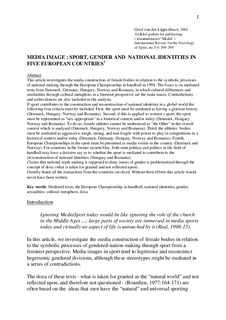Media image : sport, gender and national identities in five European countries
Journal article, Peer reviewed
Permanent lenke
http://hdl.handle.net/11250/2437825Utgivelsesdato
2002Metadata
Vis full innførselSamlinger
Originalversjon
International review for the sociology of sport 37(2002), No. 3-4, p. 369-394Sammendrag
This article investigates the media construction of female bodies in relation to the symbolic processes of national-making through the European Championship in handball in 1998. The focus is on mediated texts from Denmark, Germany, Hungary, Norway and Romania, in which cultural differences and similarities through cultural metaphors in a feminist perspective are the main issues. Contradictions and ambivalences are also included in the analysis. If sport contributes to the construction and reconstruction of national identities in a global world the following four criteria must be included: First, the sport must be mediated as having a glorious history (Denmark, Hungary, Norway and Romania). Second, if this is applied to women`s sport, the sport must be represented as ??ex-appropriate??in a historical context and/or today (Denmark, Hungary, Norway and Romania). To do so, female athletes cannot be understood as "the Other" in the overall context which is analysed (Denmark, Hungary, Norway and Romania). Third, the athletes` bodies must be mediated as aggressive, tough, strong, and non-fragile with power to play in competitions in a historical context and/or today (Denmark, Germany, Hungary, Norway and Romania). Fourth, European Championships in the sport must be presented as media events in the country (Denmark and Norway). For countries in the former eastern bloc, both state politics and politics in the field of handball may have a decisive say as to whether the sport is mediated to contribute to the (re)construction of national identities (Hungary and Romania). Claims that national myth making is supposed to deny issues of gender is problematized through the concept of doxa (what is taken for granted and not reflected upon).
